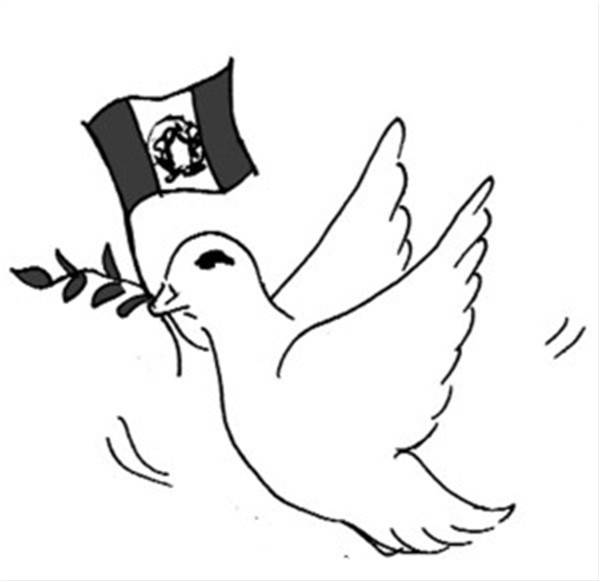
Third World War
Sir,
What happened in Afghanistan during the course of the last 35 years was the Third World War with an interval. Coincidentally, it is ending in 2014 while the First World War began in 1914. It is the longest war of its kind. And the most severe impact of this war was on Pakistan, due to a number geopolitical factors. Usage of the term ‘Af-Pak region’ was recognition of this fact.
It is now imperative that Pakistan and Afghanistan should formulate a joint strategy for recovering from the effects of this terrible war. Peace and prosperity in these countries is in the vital national interest of their neighbors, such as Iran, Central Asia, China and India, as well as the United States of America. About half of the population of the world lives in these countries.
Taraq Jazy,
Islamabad.
Death of a legend
Sir,
The brutal cold blooded targeted murder of Amjad Sabri on 22 June cut short the life of an icon who can rightly be called Pakistan’s Luciano Pavarotti. He had a strong resonating controlled voice, which he inherited from his late father Ghulam Farid Sabri and in a short span of time had created a name for himself. Amjad Sabri’s rendering of qawalis will continue to resonate in the hearts and minds of millions who were his fans all over the world.
It is unfortunate that this curse of terrorism and intolerance has deprived Pakistan of many talented and brilliant sons and daughters who excelled in their fields. Thousands have fallen prey to this devilish pursuit of blind power, greed and battle for turf in the financial hub of Karachi.
Amjad Sabri was one of a rare breed of men who owned and loved Karachi, and continued to live in the area where he was born and in the house where his father lived. He was a devout lover of Islam, and a true and loyal patriotic son of Pakistan, which unfortunately cannot be said for many whom this country had offered numerous opportunities, who have made fortunes and yet abandoned it. Fame and fortune did not go to his head. As usual there have been numerous messages of condolences by those at the helm, lacking the will to launch a ruthless drive to root out criminals and enforce the writ of the law.
Pakistan faces the biggest existential threat to its sovereignty and existence from within its borders and lack of commitment by both the political elite and establishment, who are slaves to their greed and conflicts of interest.
Ali Malik Tariq,
Lahore.
Eid for Nawaz
Sir,
Ever since PM Nawaz Sharif took over the elected constitutional prime minister of Pakistan, there is not one Eidul Fitr that he has celebrated in Pakistan. The same was the situation with Asif Zardari, who preferred to celebrate Eid in Dubai or London with his family. This is unfortunately a bitter reality that the ruling elite of Pakistan no longer have their heart and soul linked with the soil of this country, nor is there any overriding emotional attachment with it. Their hearts are with their newly adopted choice of residence, where their children live.
Every Eid, thousands of expatriate Pakistanis working in the Gulf, Mid East etc., prefer to come back to Pakistan to celebrate this religious festival with their families who live in Pakistan, while our rulers go abroad to enjoy this day with their families living there. This is the bitter ugly truth. Pakistan’s sovereignty, economy and security will continue to be compromised as long as the people of Pakistan do not wake up and make the right choices. What this country needs are leaders whose future is linked with that of people whose economic interests are solely located in Pakistan and their families live here.
Aneela Chandio,
Sukkur.
Eating chicken
Sir,
The statement by Finance Minister Ishaq Dar on the floor of the house regarding eating chicken must have taken the nation back to 18th century France when, as attributed to Queen Marie Antoinette of France, “Quils nagnet de la brioche (If they don’t have bread why don’t they eat cake)”. That was then, now it’s the twenty-first century and people are not going to eat cake in place of bread. Our finance minister, wearing a wrist watch worth millions, must have thought millions of times before advising his countrymen to eat chicken if pulses are beyond their reach, as they are unable to buy pulses with a minimum wage of Rs. 14,000. As Abraham Lincoln said, “You can fool all the people some of the time, and some of the people all the time, but you cannot fool all the people all the time.” So please, dear finance minister, stop fooling the people of Pakistan. Stop these comedy shows; such shows are meant for stage theaters. Who doesn’t know that besides many others, the ruling family is deeply involved in the poultry business, so please don’t make the National Assembly of Pakistan a stage of commercial advertisements. Chicken can’t be a substitute for pulses, a commodity which was always been available in abundance and one of the cheapest eatables. I am surprised who advised our finance minister to suggest chicken as an alternative to Mash and that too on the floor of the house. Our honorable finance minister is definitely aware of the fact that the prices of daily commodities are sky rocketing and it has become practically impossible for a layman to make ends meet.
Aamir Aqil,
Lahore.
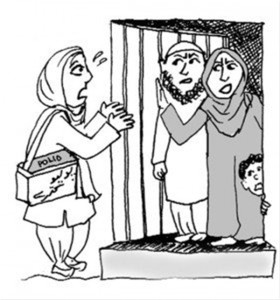
How not to fight polio
Sir,
How can we expect to eradicate Polio and illiteracy from this country when our foot soldiers – health workers and teachers – are not being paid their salaries but are expected to go unprotected to every nook and corner of this country? Millions of dollars given in grants and aid have been pilfered, with enough funds to buy SUVs for bureaucrats sitting in air conditioned offices, but no money for safely transporting lady health workers for their immunization campaigns in areas where they are working under security threats. What can be more criminal than this?
If only two months our VVIPs were sent abroad at their own expenses and the political protests called off, there would be enough police and Rangers available to accompany every health worker on a government-owned vehicle. If the army can be called in aid of civil government, paramilitary forces can also be deployed if required for polio immunization campaigns in sensitive areas. If only there were enough political and administrative will, something could be done to fight this menace that threatens to isolate us from the rest of world.
When Hitler laid a siege to Leningrad, and thousands of Russians lay dead in the freezing winter, school examinations were not postponed, but in Pakistan, when even the slightest of things go wrong, the first announcement is postponement of all examinations in Karachi.
What is precisely the agenda of the government? Are they unaware of repercussions of their insensitivity towards the future of this country?
Can we proudly justify being a nuclear capable nation, yet be declared as the worst in all other socioeconomic indicators? We have as polio, highest spread of breast cancer in Asia, and Hepatitis already an epidemic, yet our emphasis is on building motorways.
Rais Abid,
Lahore.
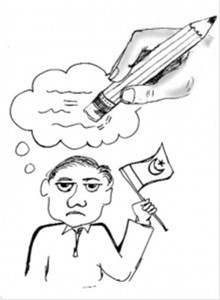
Trade is the answer
Sir,
Historical relations cannot always be a yardstick for ties in future. Foreign policy is often guided by pragmatism and national interests. China and Japan, despite a tumultuous history, have learnt to live together and cooperate for their good rather than grieving over their past. Similarly, European history tells drastic war stories between all European powers. Germany and France for example are the historical rivals. But they have learnt to live with each other as a community, they have realized that what they did in past was not at all in their benefit. Territorial gains and nationalistic spirits are not that significant as is the protection of basic human rights and formation of a welfare society as is European Union. India and Pakistan need much to learn from these examples.
Increasing trade relations between these two can not only benefit them by a boost in their economies but will also help deescalate their rivalry. Following the 1965 war, India-Pakistan trade fell drastically and came to a near standstill for almost nine years in the aftermath of this war. In the more recent history, India stopped trade via land and air routes following the attack on Indian Parliament in 2001 for some time. In 2013, trade was blocked following cross-border firing. India had not allowed Pakistan the access to Nepal, Bangladesh and Bhutan through its territory and in return Pakistan did not give transit rights to India for Afghanistan. This significantly affected trade potential, even with other neighbors.
There are ample business opportunities between the two nations ranging from joint ventures, outsourcing, technology transfers, Indian Special Economic Zones in Pakistan near the border, opening up of the Munabao-Khokhrapar route for trade, and people-to-people movement, a facilitative visa regime, mutual recognition of standards, harmonization of customs regulations and procedures, to an alternate dispute resolution mechanism, and cross-border banking facilities. Moreover, granting of MFN status to India by Pakistan would also benefit in low tariffs and high import quotas to Pakistan by India.
The SAARC aspiration for greater economic cooperation has been suffering serious jolts due to the bilateral rivalry between two of its largest nations – India and Pakistan. The platform of SAARC should be used by both states for mutual cooperation and healthy negotiations to bring up some consensus on rivalry issues and to focus on building up of trade links.
I do not perceive an ideal relationship with India immediately, but if we enhance our economic interdependence, that would reduce animosity with the passage of time.
Saleha Zia,
Rawalpindi.
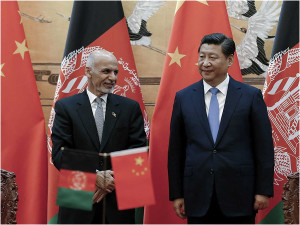
China’s charm
Sir,
Afghan President Ashraf Ghani’s first foreign visit destination was Beijing. He was warmly received by the Chinese President Xi Jinping himself at the airport that shows the increasing importance of Afghanistan to China. China being a neighbor of Afghanistan has serious stakes in peace and stability in that country therefore, based on the Chinese ethos of helping friends – the current focus of China’s engagement with Afghanistan is centered on capacity building of Afghans through financial assistance and investments, enabling them to meet the upcoming challenges successfully.
China has traditionally been keeping a politically low-profile on Afghanistan for some obvious reasons, one of them being overwhelming presence of the US and NATO, it did not want to convey any wrong signals. Now with the withdrawal of foreign forces from Afghanistan a new challenge has surfaced for neighbouing countries as to how the factors of instability could be preempted. This could only be achieved by strengthening the capacity of Afghanistan’s elected government and developing a broader consensus amongst the stakeholders. Therefore, it was for the first time that China held an international conference on Afghanistan.
China is taking keen interest and assuming a key role in eradicating poverty (one of the root causes of terrorism) in its neighbourhood by making investments and undertaking construction of infrastructural projects for better communication and expansion of trade. China’s approach towards Afghanistan is inclusive as reflected by Xi Jinping’s consultations with his Indian, Russian, Pakistani and other counterparts. Beijing has expressed interest to become part of all innovative initiatives aimed at preventing political chaos and infighting amongst Afghan groups and supports an Afghan-led and Afghan-owned peace and reconciliation process.
Over the years, China has also emerged as the largest investor in the mining and energy sector in Afghanistan and during the recent visit Afghan President expressed his country’s ‘willingness to cooperate’ with China in areas like oil and gas, mining and infrastructure projects besides welcoming Chinese investments in the country.
Fazal-ur-Rahman,
Islamabad.
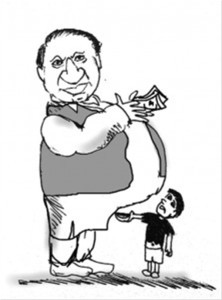
Time to deliver
Sir,
The anger on the streets is escalating because millions have been driven to desperation because of years of neglect, injustice, exploitation and the rising prices of essentials. Those who throng political protests are doing so not for the love of any party, but because of frustration and neglect by successive governments failing to provide them relief from increasing inflation.
Prime Minister Nawaz Sharif must realize that increasing foreign exchange reserves or raising another billion dollars through Sukuk Bonds does not provide two meals a day to those earning the minimum wage or paying for utilities. The cumulative effect of massive corruption and organized tax evasion by the affluent rich for over three decades has reached a saturation point, and the only remedy is to cut down on indirect taxes and impose direct taxes on the rich, who defiantly refuse to pay their dues.
This government is facing agitation because they chose to be in power after having made some promises. The people of Pakistan, having endured eight years of military dictatorship and five years of President Asif Zardari’s government, in which corruption thrived and private militias emerged, reposed their trust in the Pakistan Muslim League-Nawaz and gave it a clear mandate.
Numerous leaders from the US, the UK and other European nations, as well as the IMF and the World Bank are on record that it is time Pakistan’s affluent rich start paying taxes so that the tax-to-GDP ratio improves. Unfortunately, successive governments in power have refused to levy direct taxation on all sources of income, and instead opted to bridge the gap by indirect taxes, which are burdening the poor. This unacceptable injustice has made lives of ordinary citizens a misery.
Meanwhile, unchecked population growth because of illiteracy and resultant food scarcity has been aggravated by diminishing green agriculture belts around every major urban centre being converted to concrete jungles.
The prime minister has to decide whether he will continue to protect, like his predecessors, the few hundred thousand affluent rich traders, retailers, real estate tycoons and members of the corrupt land mafia, or face the wrath of angry millions, seeking change for the better and willing to start agitation with hopes that somebody else may deliver.
Time is running out and mere statements will not mellow the anger and frustration driven by abject poverty and hunger.
Aamir Abbas,
Islamabad.

